Transcriptie: LiF Extra live from Brussels postAML
This is Leaders in Finance, a podcast where we find out more about the people behind their successful career. We speak with the leaders of today and tomorrow to discuss their motivations, their organizations and their personal lives. Why? Because the financial sector could use a little more honest conversation. We’d like to thank our partners for their support. They are: Kayak, EY, Odgers Berndtson executive search and Roland Berger. Your host is Jeroen Broekema.
Jeroen: Welcome to an extra episode of Leaders in Finance. Today live from Brussels, right after the Leaders in Finance AML Europe event. I’m very, very happy to have five gentlemen, unfortunately only gentlemen, I don’t know how that came about, but five gentlemen that were partners of this event at my table. And I’m really looking forward to talk to them about some of the things they have experienced today. But first of all, who do we have here? I would like to go around the table and have everyone introduce himself. Please, Martin?
Martin: My name is Martin Markiewicz, I’m CEO of Silent Eight. We are a tech company, selling Artificial Intelligence solutions to large banks like HSBC and Standard Chartered and helping them fight financial crime better.
Krik: My name is Krik Gunning, I’m the co-founder and CEO at Fourthline. With Fourthline, we have built a proprietary technology to both tech or the initial onboarding as clients as well as a range of products with continuous KYC. We believe the only way to fight financial crime is through technology.
Roger: My name is Roger Kaiser. I’m the tax and AML senior advisor at the European Banking Federation.
Rick: Hi, my name is Rick Hoehne, I’m with IBM. I’m a senior partner and I lead our Risk, Fraud and Financial Crime Center of Competency. I also work closely with the Promontory Financial Group, which is a part of IBM as well.
Maarten: Hello, my name is Maarten Rijssenbeek. I’m a partner at Deloitte within the Forensic and Financial Crime Department, where we focus on assisting financial institutions with managing their financial crime risks.
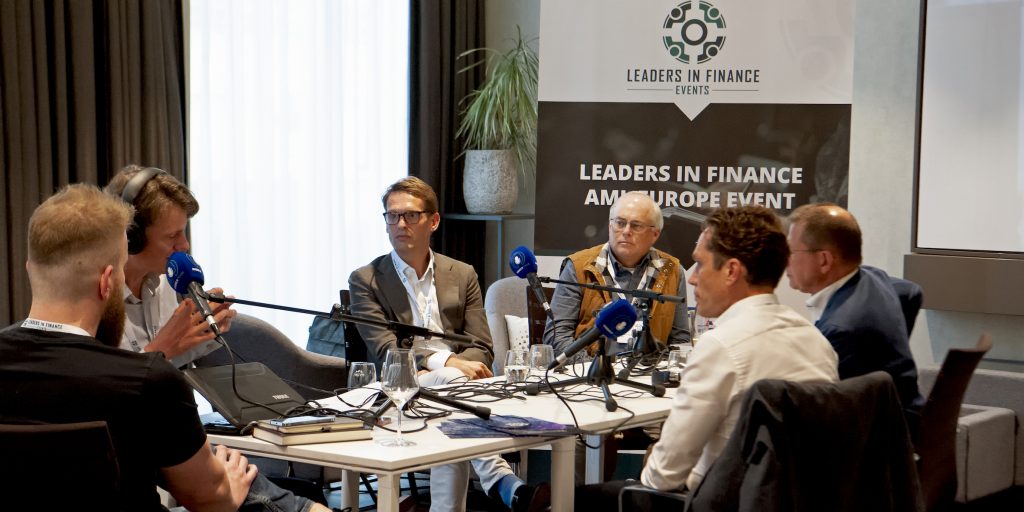
Jeroen: Wonderful, so now everybody knows who we have here. What I would love to ask you, I guess you have a lot of things that you are thinking about what you have experienced today at this event, but if you could pick only one or two things that are key takeaways for you, what would you say? Martin, can I start with you?
Martin: Sure. I loved Jason’s idea about making AML a profit activity. His idea about creating a bounty hunter program and making AML analysts actually getting paid for catching crime was mind-blowing. I love the concept. I don’t know if it’s realistic that we’ll see this thing in the future happening, but I loved the freshness of the idea. If we’re operating in some sort of sandbox, this was completely an idea outside of this sandbox. I loved to entertain ideas like these, “Are they pointing us in some new interesting direction or not?” Because from our point of view, just like you said, there are a lot of things that we can do with technology, but we’re only operating within some regulated space. So this technology can only push us so far. If we extend the space, if we make the space more diverse and allow us to do more things, then all the entrepreneurial people with technology and ideas will come in and just fill it up with great solutions.
Jeroen: That’s great, thanks for your answer. You were actually pointing, nobody could see that, but you were pointing at Krik. So Krik, maybe you can take away from here.
Krik: I think the reason you brought people together originally on your podcast was because you believe people should speak more within the financial sector. I think the event you hosted in the Netherlands showed the strength of bringing people together from both the public prosecutor side, the regulator side, as well as the bank side. My key takeaway is that now you’ve done it on a European level, which I think is phenomenal, because we do need to speak more to each other. I cannot pinpoint one specific insight, but I think the cross-federalization of the conversations today is going to make that we all walk away here stronger and more knowledgeable than we arrived. I think that’s great.
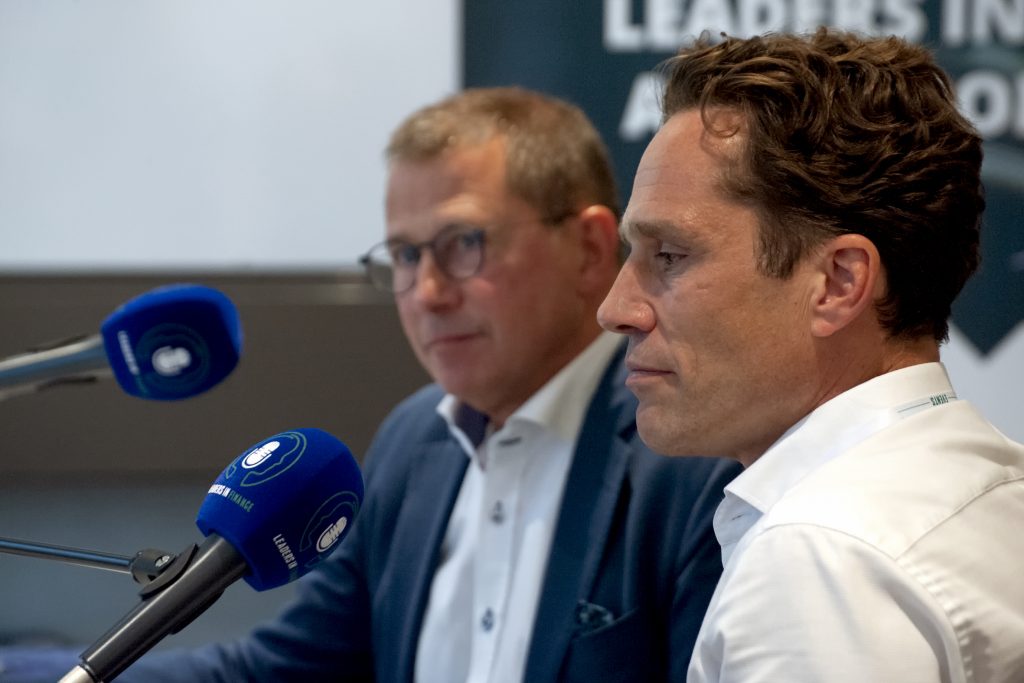
Jeroen: Thanks! Moving on to Roger?
Roger: I was amazed by the speech delivered by the head of the Latvian FIU, knowing that Latvia five or six years ago was very much a gate for Russian dirty money into the European financial system. Now Latvia is an example in terms of fighting money laundering, they have developed public private partnership and the message was very refreshing and courageous.
Jeroen: Yeah, I can totally see that! If we move on to Rick?
Rick: I think what was refreshing for me at this was to hear the open conversation about the desire to stop bad guys. So often, when we talk AML/KYC, we think about the regulatory aspects and they’re significant. But we forget what we’re actually trying to do, which is to stop the bad guys. I thought that was very refreshing. I think the other important insight is that it’s a time for change; there seems to be change in the air. When you listen to the speakers from all parts, whether it’s on the consulting side, the FI’s themselves, the regulators who are in the room, I think everybody knows that what we’re doing isn’t working. I don’t think we have a clear idea of how to make it work when you think about the challenges of data and privacy and regulation and the politics involved, all of that. But the fact that we’re starting to recognize change is really well-timed. Hearing that today was really refreshing.
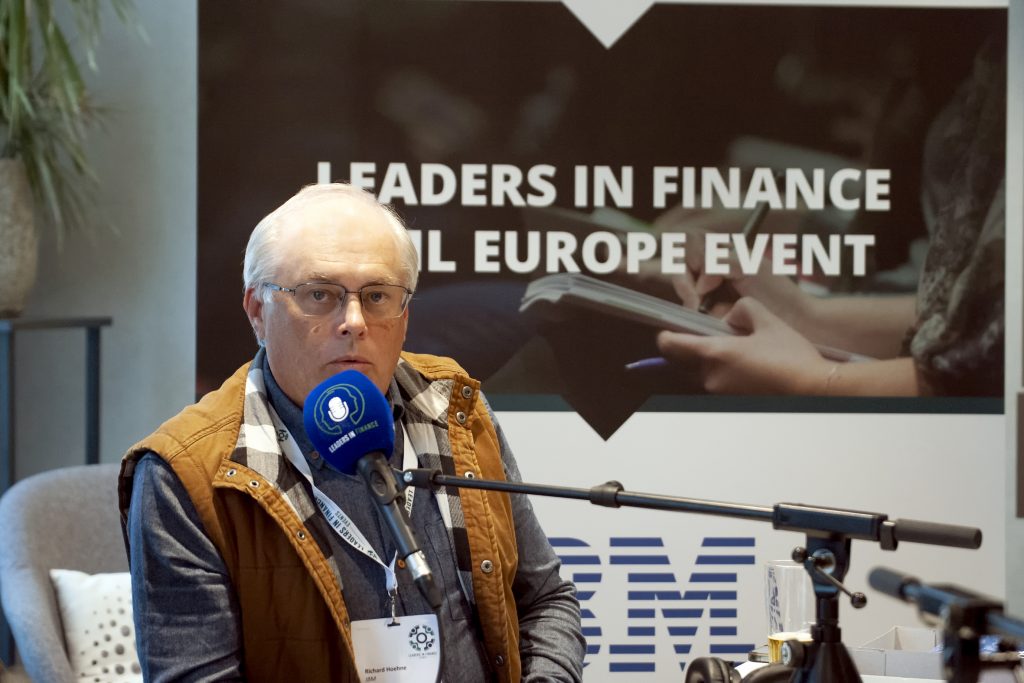
Jeroen: Thank you. And then moving over to Maarten, what were your key takeaways of the day?
Maarten: I can really add to that. I was triggered and also pleased by the provocative input of Oliver and Jason this morning where they really said that the current framework is end of life as far as it had a life at all in the beginning. And I think it really forced everyone, participants but also the audience, to really think about how we can move towards an effective framework. I was also really inspired by the passion of everyone on stage and within the audience to really move towards that next step and make an impact.
Jeroen: I agree with that. People do care, that’s a feeling I had as well. Moving on to another topic, what would you guys see as the main opportunity for financial institutions in Europe, in this case? If you could pick only one or one and a half things maximum that you think are really, really big opportunities for financial institutions, I’m pointing at all of you, who wants to take the floor and answer this question?
Rick: I think we heard a lot about the role AI can and should play in helping to actually fight money laundering activities. I think everybody acknowledged that the rules approach, while there is still a role for rules the way we’re doing it right now, is really not even helping and maybe contributing to the problem because it’s making it obvious to the bad guys how to work around things. And when you heard some of the advances that were being discussed around the role AI can play, whether it was in the context of modelling behaviours to better identify money laundering to using AI within the process of extracting information from documents, you saw that this was starting to emerge as a theme that gives us a great opportunity you can apply throughout. I know we can see that in the alert panelling/alert processing, dealing with the challenge that the rules create. So for me, that’s probably where the greatest opportunity is. But it may also be a lot of fear, when you get down to regulators and people who are not familiar with what you can do and how you can manage an AI environment. But AI to me seems like probably the biggest theme I heard out of things today.
Krik: And I’m going to fight you over that. Maybe to chime in, I think the interesting thing was that a couple of people we’ve heard today report that the Dutch Central Bank published last week in which they actually defined certain rules of engagement if you want to use AI in this context. I think that is actually extremely helpful, I agree with everything they’re saying. It’s about making sure there’s data security, making sure that you don’t discriminate, that you don’t exclude people, that you can actually explain how the model works. I think that is a lot of the advice we’re looking for; that they have these rules of engagement and can actually embrace technology.
Jeroen: So that was first Rick speaking and then Krik speaking. Who is going to go after? Martin?
Martin: I was thinking, if I would have one wish after this conference, and this would be a long-term wishful thinking, if regulators around the world would come out and say, “Tell me what you need to do a good job”, and if they listen to this and just write a blank check and just approve all those reasonable asks around data-sharing, around how to govern and use models in the space, we would be looking at a very different landscape very quickly. So one small change would make a world of a difference.
Jeroen: Thank you, Martin. Roger or Maarten, who is going to go first? Roger, please?
Roger: The message in my view is very important. We can no longer work in silos, so banks are really part of the solutions. That can take the form of public-private partnerships where information is exchanged between all actors of the AML system, including regulators, law enforcement and of course obliged entities and banks. It’s also the case of using innovative tools. We have mentioned Artificial Intelligence, it’s also the case of shared utilities.
Jeroen: Right, thank you. Sorry, Maarten, now it’s your turn.
Maarten: Roger, we have a Dutch saying: “The grass in front of you is mowed away”, because I was going to say exactly the same thing. But indeed, I fully agree with Roger. Before we start to apply AI, we first have to bring all the parties together and bring the relevant data together and create ecosystems in the fight against financial crime. I’m a strong believer in creating such ecosystems. At the same time, I think that we should also within those ecosystems focus on searching for the right needles. That was also within the panel discussion that I was able to moderate. Because sometimes we are focusing on specific crime forms that might not even be found in a specific haystack, while at the same time there might be other forms of crime which are all over the place but we are not really looking for them. Also from a risk-based approach, we should really look for what kinds of types of financial crime we are actually looking for in what kinds of haystacks.
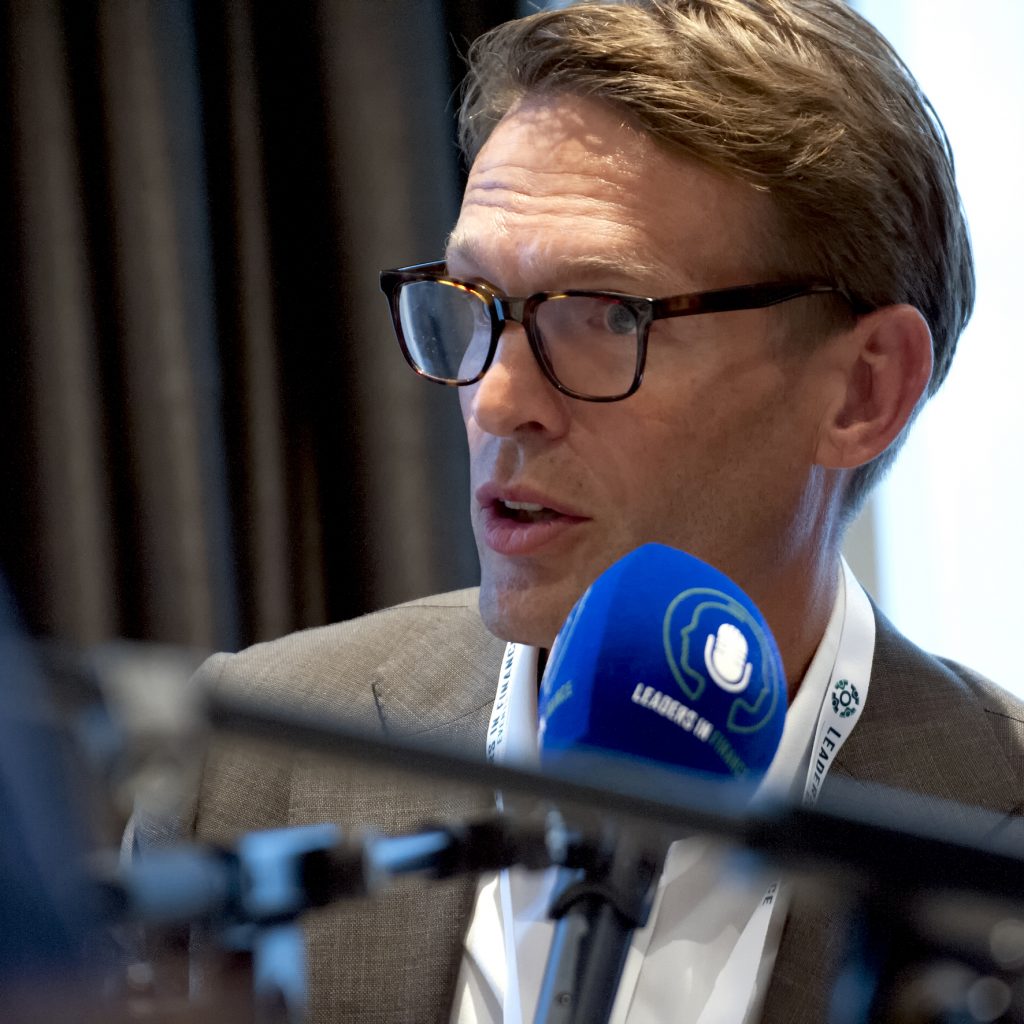
Jeroen: Thank you. Maybe yes or maybe not, but I wanted to also talk about – and I was going to say maybe not or maybe yes it may be an opportunity for Europe – this point Oliver Bullough made in his keynote speech around cash money. Because I knew there was a lot of cash still in the market. But do you guys have any fuse on this point? Because I’m still a little bit puzzled with these amounts of cash in the market and to what extent they’re apparently used for money laundering, based on his speech. Does anyone want to respond to that point?
Krik: Maybe I’ll take it. I think the discussion was okay, if you have decommission of the 500-euro-note, how much further should you go? And for the people who weren’t here, he indicated that an average cash transaction is 12,31 €. So you don’t need a banknote above 20 €. In my view, that’s an example of ‘where the cure is worse than the disease’, because then you’re taking away bills. If you think that that means that criminals will not find an alternative item to store their value, we’ve heard it this morning, apparently Gucci bags are a great way to store value. So I’m not necessarily convinced that taking cash out of the market is going to solve the end of the line problem.
Jeroen: Does everyone agree with this?
Martin: I have no idea, but at least my thinking was, when I was hearing this story – and he was delivering a great story; the storyline, everything was absolutely spot on – “Is this one a correlation? Is there some causation there or just a correlation? Maybe there is just more cash and how tight is it statistically with money laundering and using cash for money laundering?” Because it fits the narrative perfectly. I was listening, it checked all the boxes, so it must be true. But then I started thinking, “Is it? Are we maybe not looking at some other factors?” So on this one particular thing, I had some question marks. Is this really a thing? It might be, I just don’t know.
Jeroen: Maarten?
Maarten: Whether that cash money is or isn’t used in the criminal sector, it also relates to the point I made earlier. If you have a very cash-intensive criminal activity, like for instance drug trading, it doesn’t make sense to fully focus within financial institutions on that particular type of money laundering. While you also have criminal activities that are not at all cash-intensive, where the money is already in the financial system and I think those are the needles that you should be looking for within financial institutions. It’s also about tailoring your approach and I think for financial institutions the approach should be tailored to less cash-intensive criminal activities. Obviously, we should also take a good look at the cash-intensive industries, for instance drug trading. But maybe in some other form.
Jeroen: Right. Anyone else that wants to respond on this point? Rick?
Rick: I couldn’t help but think when he was describing that about the Netflix series Ozark and seeing what it took to actually launder cash. And when you think about the criminal activities, cash is still a good thing because it has no history, it has no trail. You don’t leave a fingerprint. So I think we do have to consider the cash factor. But I guess my point is there’s no simple model that covers everything. To your point earlier about looking for the right needle and the right haystack, I think this is a needle in a haystack, I don’t think it’s the only needle, I don’t think it’s the only haystack. The one thing that we are starting to see more challenges with, that was also discussed in that, was the notion of trade-based money laundering. We’re seeing a tremendous amount of money laundering going through trade. It’s very easy, it’s a complex paper-driven process and I think that lends itself to some of the technologies we can bring to table now to address. I was laughing when he said Canada might be better off, because of the fact that they legalized some of the drugs so that no longer can money. But what they’ve done instead is put it all into real estate. So the real estate market in Canada is driven a lot right now by a lot of money laundering coming through and making investments in their market. So there is no single model here. But I do think the nature of money laundering is evolving to being trade-based and that whole point of looking in the right spot. I think that’s something we need to explore a little bit more.
Jeroen: Do you want to add something, Roger?
Roger: Yes, the European Banking Federation, EBF, has been alerted to already some years ago by the increased magnitude of money mules and we have joined efforts with Europol to conduct an awareness-raising campaign, which is called EMMA. It’s very important to make people understand the risk that they are facing if they enter into such schemes.
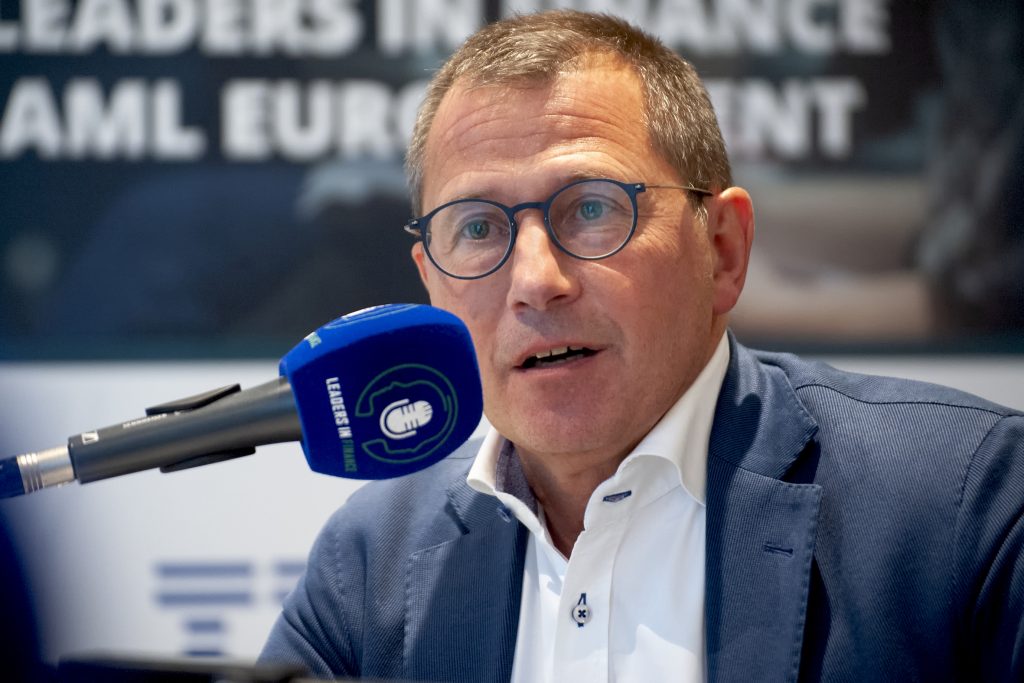
Jeroen: Thank you very much for adding that. And last but not least, I would love to go around this table and ask you on a bit lighter level if you have a fun fact of today or something you’ve experienced or something that has surprised you or made you laugh or a connection you’ve made you’re surprised about? Whatever it may be, before we wrap up.
Krik: Looking around a table with six white males, I want to bring the attention to the fact that not only does Fourthline have fifty different nationalities on the team and close to a 50/50 gender split, we actually hosted a dinner last night with attendees of this event with more women at the table than men. So it is possible.
Jeroen: I know I take all the blame, that’s for sure! But equally, we have partners and they all sent a male to this podcast. But thanks, Krik, I completely agree with you. Anyone else? Martin?
Martin: What I found very funny is that I showed up for an AML conference and it started off with Oliver’s and Jason’s presentations. And they just threw a grenade in the room; everything exploded. I just learned in the first two hours that we’re all useless and we should just go and look for another job. And I was just thinking it’s so brave to do something like this at the beginning of a conference that’s about a very serious topic, that’s super serious, where a lot of illegal things need to be discussed, a lot of hard technical challenges that need to be discussed, a lot of experience from the field that needs to be shared. And you started off, instead of going through a boring presentation or some bullet points or something like that, you just slap everyone in the face, they wake up and then you go through all this content. It was brilliant. I laughed and when we were going to lunch break, I was like, “I can’t believe I’m at an AML conference.”
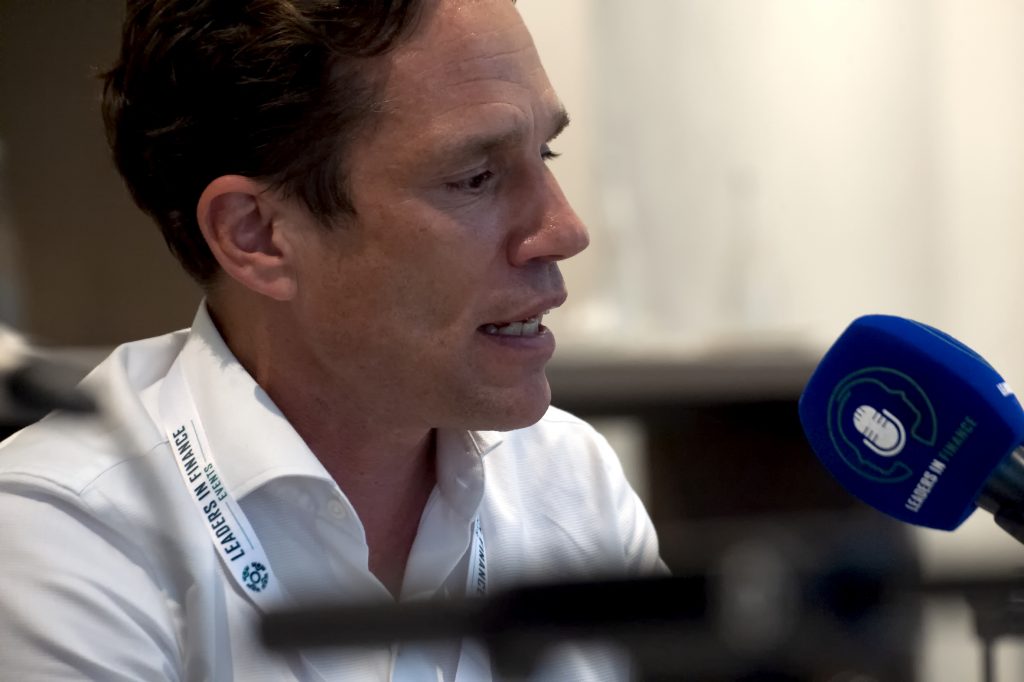
Jeroen: Thank you. Rick?
Rick: I did like the trigger warning, I thought that set the stage well. For me, it was really simple, we were in the last session with the panellist, the window was open to let some air in and there was a protest going on outside. And perfectly timed, one of the panellists’ points, there was a tremendous yell/cheer song, a chant or whatever it was came up. And we all looked and said, “That’s probably the most important point we’re here today.”
Jeroen: Cool! Actually, by the way, Rick, I think it’s Wales playing against Belgium tonight.
Rick: I heard, yeah.
Jeroen: Okay! Anyone else? Roger?
Roger: I think they were very provocative presentations. And yes, of course, people were a bit surprised, but at the same time I think people are very enthusiastic and passionate about the fight against financial crime and indeed, there is a lot to do. We have to tackle these inefficiencies in the AML-framework. But we will continue to fight.
Jeroen: Absolutely, thank you! Maarten?
Maarten: What I really enjoyed not only today, but also yesterday when I ran into a former colleague of mine is the amount of passion that everyone is showing to really make this work, the fight against financial crime. And it’s also a very small world, because the guy I ran into yesterday I knew from my former life when I was still a prosecutor and he was working at the Dutch supervisor. Now we’re both in the private sector, but still fighting the same fight. So it’s really good that we’re all here on the same side connecting with each other.
Jeroen: Wonderful, thanks Maarten. Martin, you want to add something?
Martin: Yeah, I just wanted to say that I liked what Maarten just said about passion. I think that all these things landed so well because we’re just passionate about this topic and passionate about what we’re doing. If we didn’t, we would just snooze through the whole thing and just go home and nothing would change. But just because we all care about this job and all care about the output of it, that’s why we’re doing all of this stuff and every time someone points out something interesting to us, we just get all hyped and want to learn more.
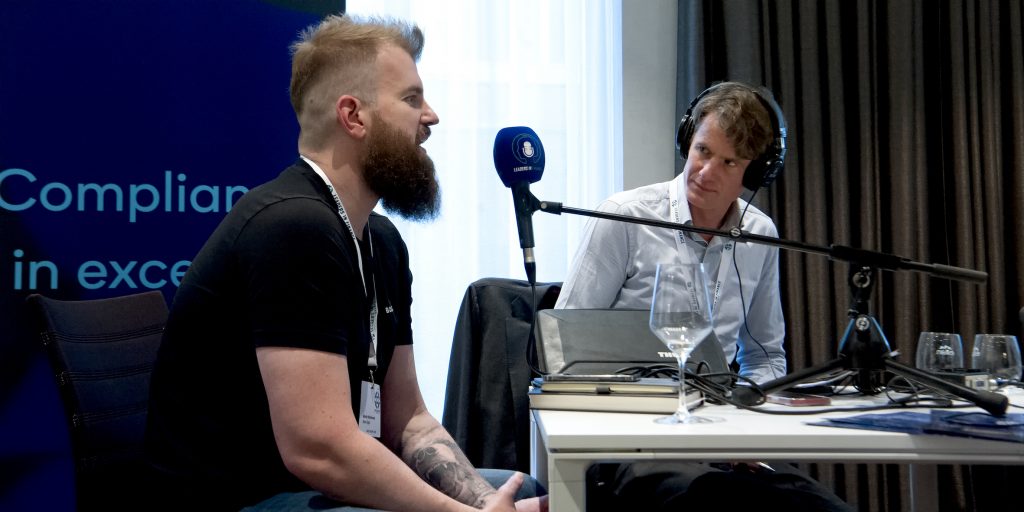
Jeroen: Great! This is the moment in the podcast that if you really want to add something, you should do it now. This is not a question, but if you want to add something related to the event today, please do. I’m just looking around, is there anyone who wants to add something?
Rick: I just want to thank you for putting together a good agenda, a good topic, a really diverse group of people and it was a brilliant session. It did capture our passion. The problem with it, frankly, is how do we continue the discussions that we started? Because there are about three or four that happened today that I would just be thrilled to pick up and continue a bit of a discussion, a bit of a debate. But I think you guys did a great job pulling this together.
Jeroen: Wonderful! That’s very nice of you saying that and it’s at the same time a challenge for us to keep that debate going. So maybe that’s work for us to do. But all thanks go to you here, both for speaking with me at this extra episode of Leaders in Finance, but also for being partner of this event. I thank you very much and I hope that we can do this event next year again same place. Thank you so much!
You’ve been listening to Leaders in Finance, we hope you’ve enjoyed the episode and we’d love to hear from you. What’s on your mind, who would you like to hear next? Tell us in an Apple or Google review, via e-mail or our social media channels. We’d greatly appreciate it! Finally, we’d like to thank our partners for their ongoing support. They are: Kayak, EY, Odgers Berndtson executive search and Roland Berger. Thank you for listening!

